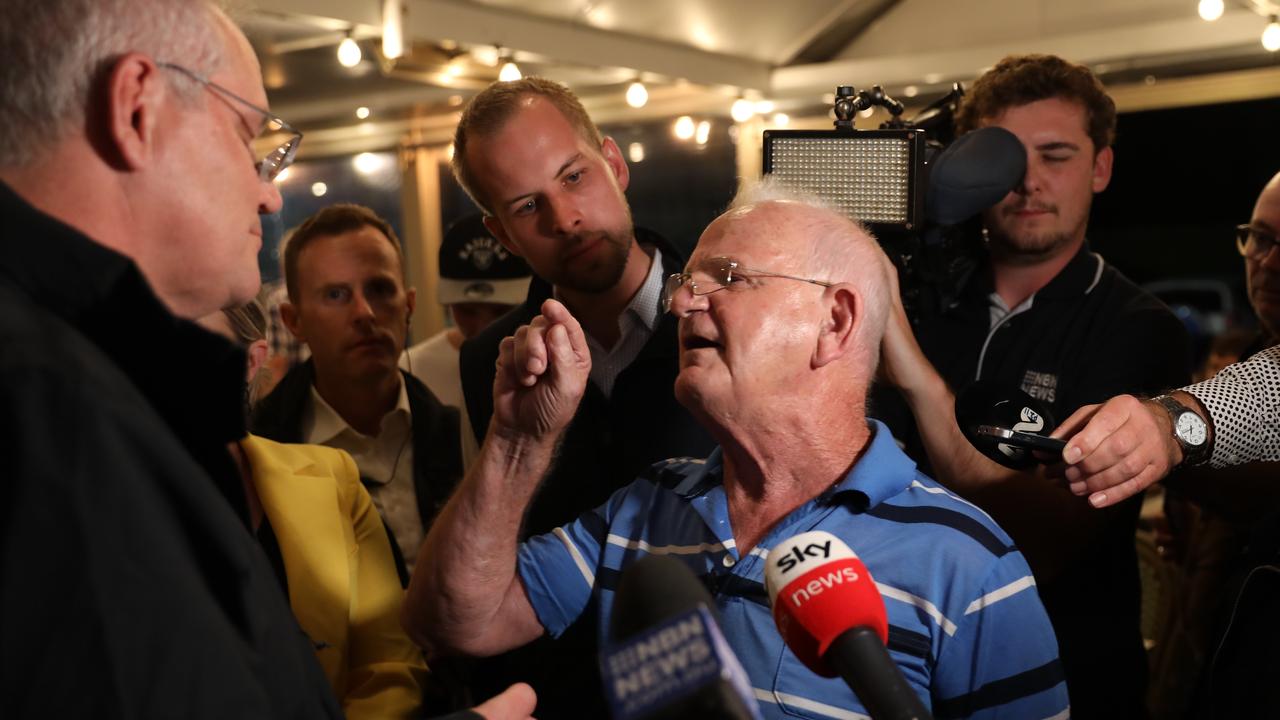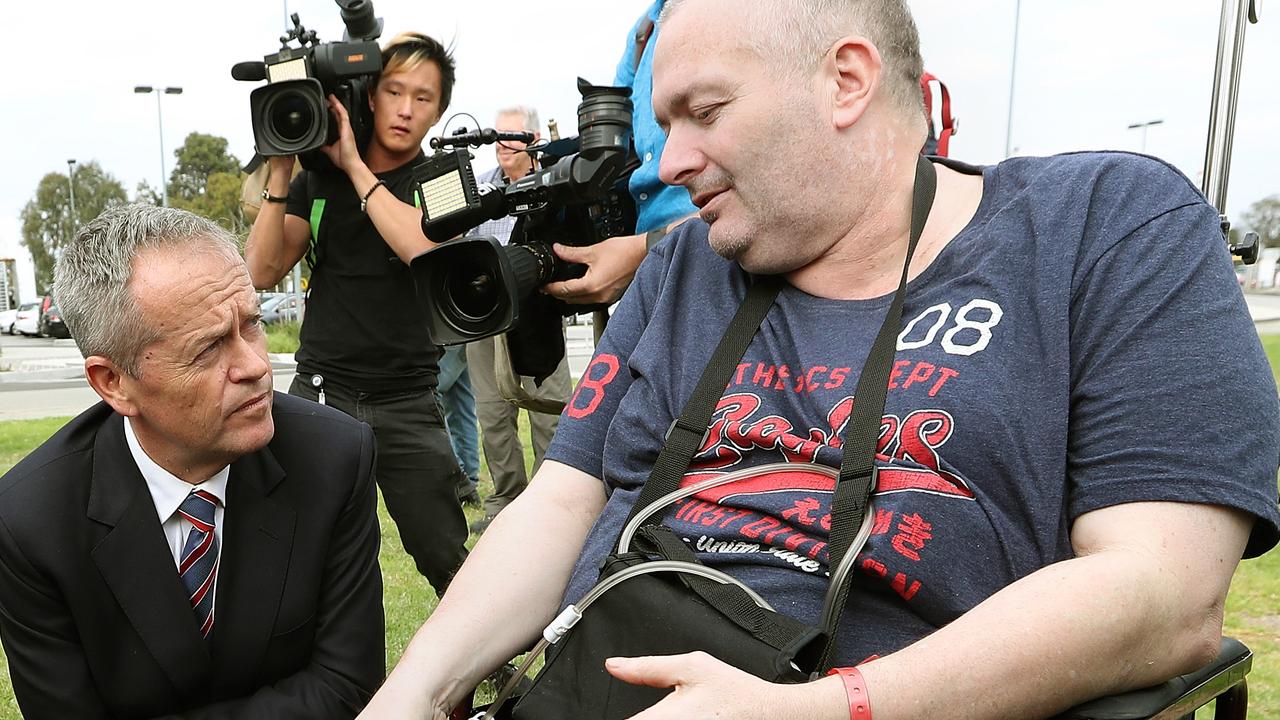Two interactions with members of the public show Anthony Albanese could learn from Scott Morrison
Anthony Albanese and Scott Morrison were both confronted by members of the public this week. Only one of them passed the test.
OPINION
The federal election is about to be called, and you know what that means: Nobody is safe.
For the next five weeks, Australians who just want to get their grocery shopping done without being accosted by a politician must endure the prospect of Scott Morrison or Anthony Albanese showing up to interrogate them, comically large media pack in tow.
There is a silver lining though: The politicians aren’t safe either.
All election campaigns are packed with stage-managed events designed to avoid any headline-stealing embarrassments. Such events are typically tied to policy issues, but otherwise teach us little of value.
The leaders’ interactions with random members of the public are much more interesting.
In these next few weeks, Mr Morrison and Mr Albanese will both be forced to speak to Australians who do not like them. They will face blunt, hostile questions that can’t be dodged by changing the subject or moaning about the media.
How each man handles those situations will tell us something substantive about him.
We got a little preview on Wednesday, as both leaders were confronted by members of the public within the space of a few hours.
You likely saw the incident involving the Prime Minister. As he visited a pub in Lake Macquarie, Mr Morrison was berated by a furious gentleman who said he was “sick of your bulls**t”, among other things.

Mr Morrison engaged with the man, listening to him for a full five minutes before trying to end the conversation (at which point the man’s temper fully erupted).
Compare that to how Mr Albanese handled a mild-mannered interloper who gatecrashed a media conference in Perth.
“I’m not a media person, I’m just a local resident. Thank you for coming to my neck of the woods. I’ve got a tough question–” the man began.
The Labor leader cut him off.
“Hang on, hang on, I’m sorry. We can’t–” Mr Albanese said.
“I’ve got a tough question. Are you up for it?” the voter pressed.
“I’m absolutely up for it. And sorry, we can’t really do that. The protocol – the media alliance will be a bit upset if we...” continued Mr Albanese.
“I don’t think the media would mind at all,” said the man.
(He was correct about that, by the way. The media is, as a rule, pro-members of the public getting to ask politicians questions.)
After again claiming he was “up for it”, Mr Albanese shut down the interaction.
“We’re just taking questions from journalists. Because that’s what you do at a press conference,” he said, adding that he was “happy to have a chat afterwards”.
Should Anthony Albanese have answered the question? 🤨
— Flash News (@FlashNewsAU) April 6, 2022
A heckler managed to gatecrash the opposition leader's press conference in Perth today, demanding he answer a 'tough question'.#FLASHNEWSpic.twitter.com/Gkbz7rrQTH
There are two possible explanations for Mr Albanese’s response to the situation: Either he is the only person on Earth who’s genuinely super passionate about the unwritten rules of press conferences, or he knows how unpredictable random voters can be and was scared of something embarrassing happening in front of all those cameras.
Neither explanation inspires admiration.
Politicians and their staff spend a lot of time worrying about the wrong things, chief among them the threat that an awkward moment will dominate the news cycle for a few hours. And so they focus on minimising the risk of that happening.
Ask yourself though: Looking at those two moments this week, whose response do you respect more? Mr Morrison standing there and copping it for five minutes? Or Mr Albanese shutting a voter down without even listening to his question, let alone answering it?
This isn’t a partisan thing. Switch the names around if you like, pretend the roles were reversed. Your answer should be the same.
We do not expect our leaders to be universally popular. If a politician interacts with enough members of the public, someone will inevitably chew them out.
We might have a laugh at Mr Morrison or Mr Albanese’s expense, but most of us are not judging them for getting shouted at. We’re judging their response. That’s what matters.
There was a small moment during the last election campaign that stuck with me. Then-opposition leader Bill Shorten was holding a press conference outside a hospital in Melbourne when a gentleman in a wheelchair joined the pack of journalists.
The man, a cancer patient named Rob Gibbs, was at a cafe nearby when he spotted Mr Shorten. Mr Gibbs had been burned badly in the past by unfulfilled promises (specifically from Labor Premier Dan Andrews), and wanted to ask the Labor leader about his own commitment to increase cancer funding, which he said was “hard to believe”.
Mr Shorten listened to his question and answered it. Then, after the press conference, he took the time to kneel beside Mr Gibbs and speak to him at much greater length.

I can’t tell you whether Mr Shorten genuinely cared about the guy’s plight or merely understood the optics of the situation.
The point is, whatever his motive, he did the right thing by listening to Mr Gibbs, when he could have instead sought to avoid the confrontation. And I daresay that made some voters respect him a tiny bit more.
Mr Albanese is not in the habit of emulating his predecessor, but in this case, he should.






